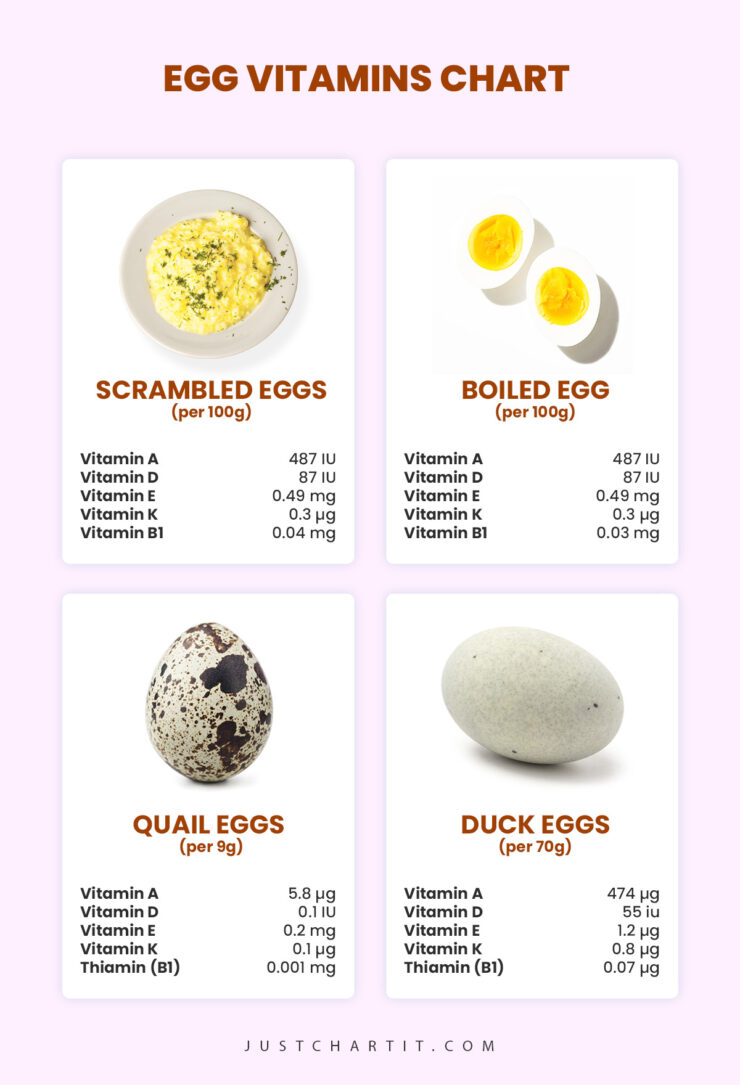Eggs are a perfect two-minute meal that is best for when you are in a hurry or tired from a long hectic day. It’s quick, can be cooked in several ways, and tastes great. Not to forget, it’s loaded with vitamins and minerals needed by our body to function correctly.
Eggs also provide nutrients for the growth and repair of our bones, teeth, and organs. So, if you are not eating eggs, you are missing out on a lot of good stuff your body needs. Here’s an egg vitamin chart to let you know about egg vitamins and minerals.

Boiled Egg Vitamins
There are so many delicious ways of eating eggs; boiling them is the healthiest cooking method and preserving nutrients. Sprinkling salt and pepper is the most popular way to enjoy hard-boiled eggs. The hard-boiled eggs are filled with proteins, nutrients, and healthy fats.
One medium hard-boiled egg of 50 g contains 77 calories, 0.6 gms of Carbohydrates, 5.3 gms of Fat, and 212 mg of Protein.
Boiled also includes 86mg of Phosphorous, which is 9% of the body’s recommended daily intake of nutrients. 15.4 mgs Selenium, equivalent to 22% of the body’s recommended daily nutrient intake. We do not forget the vitamin goodness of the eggs; consult the table below to know which egg contains vitamins.
| Vitamin | Quantity in Boiled Eggs (per 100g) |
|---|---|
| Vitamin A | 487 IU |
| Vitamin D | 87 IU |
| Vitamin E | 0.49 mg |
| Vitamin K | 0.3 µg |
| Vitamin B1 | 0.03 mg |
| Vitamin B2 | 0.25 mg |
| Vitamin B3 | 0.07 mg |
| Vitamin B5 | 0.62 mg |
| Vitamin B6 | 0.08 mg |
| Vitamin B9 | 47 µg |
| Vitamin B12 | 0.89 µg |
Vitamins in Scrambled Eggs
Scrambled eggs are delicious and nutritious, and contain all the elements for a perfect and quick meal any day. Eggs are not just readily available but are also loaded with essential nutrients, making them the healthiest food around.
According to USDA data, one large egg of about 50 grams contains 78 calories, 6.3 gm of protein, 5.3 gm of fat, 186 mg of cholesterol, 25 mg of calcium, 86 mg of Phosphorous, 60 mg of Potassium, 0.6 gm of Carbohydrates, and 62 mg of Sodium.
And we are still going; it also contains other nutrients, such as Zinc, Selenium, Magnesium, and Iron, that our body needs to carry out its various functions.

Dr. Michael Greger is a physician, best-selling author, and founder of NutritionFacts.org. While he generally promotes a plant-based diet, he acknowledges that eggs can be a source of essential nutrients.
He advises moderation and encourages selecting organic or pasture-raised eggs when possible If you want to know about the vitamins found in the egg, then look into the comprehensive chart below.
Also read: Vitamin C Foods list
| Vitamins | Quantity in Scrambled Eggs (per 100g) |
|---|---|
| Vitamin A | 487 IU |
| Vitamin D | 87 IU |
| Vitamin E | 0.49 mg |
| Vitamin K | 0.3 µg |
| Vitamin B1 | 0.04 mg |
| Vitamin B2 | 0.34 mg |
| Vitamin B3 | 0.1 mg |
| Vitamin B5 | 0.51 mg |
| Vitamin B6 | 0.1 mg |
| Vitamin B9 | 47 µg |
| Vitamin B12 | 0.89 µg |
Vitamins in Duck Eggs
People who are big fans of eggs love to devour duck eggs because of their rich taste, creamy yolk, and eggy flavor. Moreover, duck eggs are 50% bigger, and their shells are a treat to the eyes. Duck eggs contain some added nutrients, such as those that benefit your brain and eyes. The antioxidants help prevent age-related infections and diseases.
Vitamins in chicken eggs are slightly less than in duck eggs because of their size, which weighs around 70 grams. An average duck egg contains 130 calories, 9.6gm of Protein, 9.2gm of Fat, 619mg of cholesterol, and 1.2gm of Carbohydrates.
Other essential nutrients include 140mg of Potassium, 1.4mgs of Zinc, 27.4mgs of Selenium, 2.7mg od Magnesium, 2.7mg of Iron, 41mg of Calcium, and 187mg of Potassium. Along with these vital nutrients, various vitamins are found in duck eggs below.
| Vitamin | Amount in Duck Egg (per 70g) |
|---|---|
| Vitamin A | 474 micrograms |
| Vitamin D | 55 international units |
| Vitamin E | 1.2 milligrams |
| Vitamin K | 0.8 micrograms |
| Thiamin (B1) | 0.07 milligrams |
| Riboflavin (B2) | 0.36 milligrams |
| Niacin (B3) | 0.1 milligrams |
| Vitamin B6 | 0.23 milligrams |
| Folate (B9) | 68 micrograms |
| Vitamin B12 | 2.7 micrograms |
Vitamins in Quail Eggs
Quail eggs are just one-third the size of an average chicken egg. They are a cute little alternative to chicken eggs. They taste like chicken eggs and have cream-colored shells with brown spots and deep yellow-colored yolk.
They are nutritious, looking at their size, but there are precautions you need to take while consuming them if you have an eager g allergy or are pregnant.
An average quail egg is nine gms and contains vital nutrients including Protein 1 gm, Fat 1gm, Cholesterol 76mg, and Carbohydrates 0.1gm. Other essential nutrients include 14g of calories, 3mg of Magnesium, 23mg of Phosphorous, 12mg of Potassium, 13mg of Sodium, and 9.7mg of Selenium. These eggs are also rich in different forms of vitamins. To know Quail egg vitamins consult the table below.
Also, read: Birds Egg Identification chart
| Vitamins | Amount in Quail Egg (per 9g) |
|---|---|
| Vitamin A | 5.8 micrograms |
| Vitamin D | 0.1 international units |
| Vitamin E | 0.2 milligrams |
| Vitamin K | 0.1 micrograms |
| Thiamin (B1) | 0.001 milligrams |
| Riboflavin (B2) | 0.04 milligrams |
| Niacin (B3) | 0.02 milligrams |
| Vitamin B6 | 0.002 milligrams |
| Folate (B9) | 1 microgram |
| Vitamin B12 | 0.12 micrograms |
Nutrition in Eggwhite vs Yolk
Everyone has their preference when it comes to eggs some people prefer the egg whites and some people love the yolk. People watching their weight like to eat only egg whites as it contains only 15 calories compared to yolks, which contain around 57 calories.
Eggs have high quality protein, almost 10.8g per 100g, whereas the egg yolk contains a whopping 16.4g per 100g.
Egg yolks contain high protein, vitamins, and mineral content, whereas egg whites contain fewer nutrients. Egg yolk is also rich in Omega-3 fatty acids needed for brain function; however, egg whites have none.
| Nutrient | Egg Yolk (per large egg yolk, about 18g) | Egg White (per large egg white, about 33g) |
|---|---|---|
| Calories | 55 g | 17g |
| Protein | 2.7 g | 3.6 g |
| Fat | 4.8 g | 0.1 g |
| Saturated Fat | 1.6 g | 0 g |
| Monounsaturated Fat | 1.9 g | 0 g |
| Polyunsaturated Fat | 0.7 g | 0 g |
| Cholesterol | 184 mg | 0 mg |
| Vitamin A | Yes | No |
| Vitamin D | Yes | No |
| Vitamin E | Yes | No |
| Vitamin K | Yes | No |
| Vitamin B12 | Yes | No |
| Riboflavin (B2) | Yes | Yes |
| Folate (B9) | Yes | No |
| Iron | Yes | No |
| Potassium | No | Yes |
| Sodium | No | Yes |
| Magnesium | No | Yes |
| Phosphorus | No | Yes |
| Selenium | Yes | No |
Eggshell Vitamins
Eggshells comprise 40% Calcium, protein, and other minerals. Eggshells have been used for decades as a natural egg supplement, as half an eggshell is enough to meet the daily requirements of Calcium for an adult of 1000mg daily.
Some studies suggest that eggshell powder can be used to improve bone strength in people who have Osteoporosis. It’s proven to be much more effective than calcium carbonate supplements.
However, when consuming egg shells, boil them and make a fine powder to help prevent injury or infection. Eggshells do not contain a significant amount of vitamins; hence it’s mainly used as a calcium supplement.
FAQs
Which Vitamin Is Absent in An Egg?
All forms of vitamins are found in eggs except for one, which is vitamin C. Vitamin C is missing in eggs as it is primarily found in citrus fruits such as strawberries, kiwi, etc. It’s also found in juicy vegetables such as tomatoes and green leafy vegetables such as broccoli.
Final Words
Eggs are a quick fix, so if you cook them too much, their texture may change, and their nutrient content may be altered by the cooking method and ingredients. A study suggests that cooking chicken eggs can decrease their vitamin A content by 20%.
Other studies suggest that antioxidants present in the eggs are also altered by the heat and cooking time. So, better quick it at low flame and avoid overcooking to enjoy all its goodness illustrated in the egg vitamin chart given above.